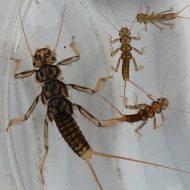Saturday 7th December 2019
Water Resources Management Training in Co. Louth
What a great turn out on the River Glyde (Castlebellingham) yesterday for our small streams assessment demonstration! The group of some 38 committed individuals included seven super enthusiastic and very knowledgeable budding young freshwater biologists. What a great morning.







Our treasure trove of invertebrates included: a large variety of mayflies, cased and uncased caddis, Simulium (blackfly), water slaters, shrimp and shells of the highly conserved swan mussel, Anodonta cygnea. Hopefully this indicates a solid population of these increasing rare and long lived creatures further upstream. Many of yesterdays’ participants are involved in actively planning exciting new freshwater awareness programmes in County Louth.
Don’t forget next week’s important meeting of the Dundalk Bay Rivers Association in the Creative Spark Complex , Dundalk, on Sunday 15th December 2019 – from 10am-1pm – #dundalkbayriversassociation
(also they have more photos from this event on the River Glyde at Castlebellingham )
